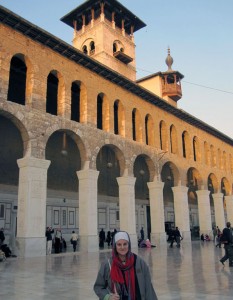When most people think of Russia, they usually don’t think of the large number of Muslims that have lived within its borders for centuries. But in my ten-year quest through Africa, the Middle East, Central Asia and Eastern Europe to visit as many mosques, shrines, and Sufi teachers as possible, I was determined to see the mosques in St. Petersburg and Moscow–because I wanted to learn more about the history, practices, and Islamic jurisprudence of the region from imperial times through the Soviet era to the present. It was my passion for both Middle Eastern and Slavic Studies that compelled me to make the study of Sufism and Islamic law in Russia and Central Asia the focus of my Masters degree at Columbia in Russian, Eastern European and Central Asian Studies. When I first got to Russia, I was amazed by how interconnected these two regions of the world are–especially in the religious realm–even though we tend to put them in very different categories.
For reasons too complicated to explain in a short blogpost, Muslim religious scholars in Russia have been promoting Sufism for years. In fact, several months ago, Moscow’s chief Mufti Albir-khazrat Kragnov called for the Muslim community in Russia to integrate more Sufism into their spiritual lives. He also called on Russia to invite Muslim scholars from Syria to Russia to learn more about Syria’s “positive inter-confessional consensus” and “similarity with Russian realities.”
This is just one example of how religious officials at the state level from Syria and Russia have been engaging in an ongoing spiritual dialogue–based heavily on the doctrines of Sufism, as well as the explicit desire to improve Muslim and Christian relations…

